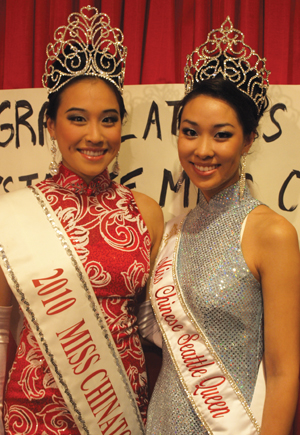By Caroline Li
Northwest Asian Weekly

Miss Chinatown USA, Crystal Lee (left), with Miss Chinese Seattle Queen, Cynthia Vuong (Photo by Caroline Li/NWAW)
This month’s Seafair festivities included the annual Chinatown Seafair Parade and the celebration of local
community groups and talent. The parade is hosted by the Greater Seattle Chinese Chamber of Commerce, which is also hosting the Scholarship for Women Program (also known as the Miss Chinatown Pageant).
Though the pageant court is seen in the parade every year, being a part of the pageant is about more than just public appearances. Community involvement is seen across the nation. Historically, Miss Chinatown contestants represented family associations and sold raffle tickets. The contestant who sold the most tickets was crowned Miss Chinatown in her city.
In the late 1950s, the Chinese Chamber of Commerce in San Francisco changed the local pageant into a national event — Miss Chinatown USA.
It drew the winners of local pageants across the nation to compete for the national title. Today, although raffle ticket sales are no longer the key to winning, the significance of representing your family name is still emphasized.
This year’s Miss Chinatown USA, Crystal Lee, continued the tradition by taking a trip with family members to introduce themselves to and meet other Lees in the Pacific Northwest. They will visit local family associations, including Seattle’s Lee Association.
Before entering her sophomore year at Stanford University this fall, Lee specifically visited Chinese communities in Portland, Ore., and Seattle. Leaders of the Lee Association in San Francisco spoke highly of the organization’s tight-knit relations with chapters in other states, says Lee, who shares her reflections on her trip. She experienced the pageant and grew up as a Chinese American.
 Miss Chinatown USA, Crystal Lee, with some members of the Lee Family Association of Seattle on June 17. (Photo by Caroline Li/NWAW) |
NWAW: Your father, uncle, younger sister, and older cousin from Taiwan made the trip with you. You had used the trip to connect with other Lee’s and also as a family vacation for sightseeing. What did you think?
Lee: The moment I arrived in Seattle, I was impressed by the beautiful greenery. The trees and natural life make Seattle a very refreshing and scenic place to experience.
I am also impressed by the friendliness of the locals. Most big cities, in my experience, tend not to be populated by so many outwardly warm and amicable personalities. Seattle has the feel of an urban-metropolis combined with small-town, old-world kindness in which strangers make eye contact and greet each other with smiles as they pass.
NWAW: Were there any surprises on the trip?
Lee: I was not expecting such a warm welcome from the Lee Associations in Portland and Seattle. I initially thought I would merely visit both associations’ headquarters, pay respects as a representative from San Francisco’s Lee Association, and meet local leaders before I would see them in September in Philadelphia for the Lee Association National Convention.
I was able to do the above and enjoy a delicious 10-course Chinese banquet complete with media representation, various gift presentations, and a lovely tour of Seattle from Miss Chinese Seattle herself, Cynthia Vuong. The highlight of my experience was [getting] a tour around Seattle from a true local.
NWAW: You taught yourself Cantonese and Mandarin. Why did you choose to pick up those language skills?
Lee: I grew up speaking English because of my father’s limited Chinese. I realized the importance of speaking Mandarin and Cantonese when my mother enrolled me in weekly Chinese school classes. So I took an interest in improving my skills by watching Cantonese and Mandarin television programs.
My mother is [a] first generation Chinese from Taiwan. My father is second generation, born and raised in San Francisco. I continue to pursue Chinese language by enrolling in Mandarin and Cantonese courses at Stanford, and I hope to be fluent in the near future.
It means that I can engage with Chinese communities abroad, open up career opportunities in Asia, and one day, pass on the beautiful language to my children.
NWAW: Was the pageant what you had initially expected? What have you gained from your experience so far?
Lee: Ever since I submitted my application in October 2009, I was focused on doing my personal best and preparing for every area of competition. But pageant preparation was not much different from living a normal existence. Eating healthy, staying abreast of current events, dancing and exercising frequently, brushing up on my Chinese skills, and preparing a pretty wardrobe are steps that I thoroughly enjoyed.
Among other things, I expected to improve my onstage speaking skills, Chinese-dance skills, and ability to convey to the audience an overall impression. And I was the best contender for Miss Chinatown USA 2010 in those things.
I also gained greater courage in asserting to the public. Pageant-involved women are not all as unintelligent, reliant, and self-absorbed as the society contemporarily portrays them. I hope to be a living example of a woman who has a crown but also has something substantial and valuable inside the head wearing it. ♦
Caroline Li can be reached at info@nwasianweekly.com.




What are the requirements to enter the Miss Chinatown Seattle competition?